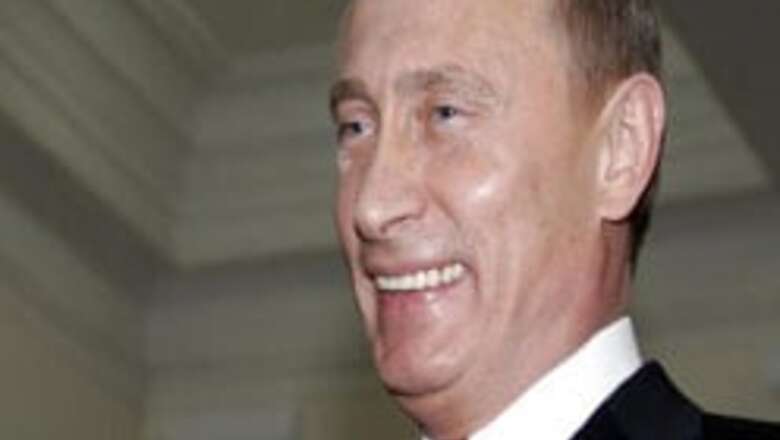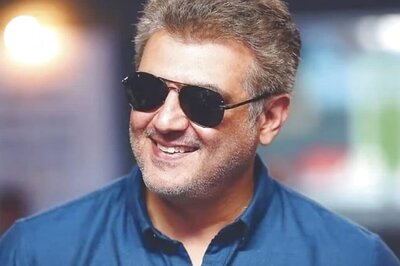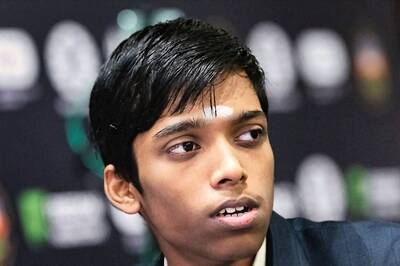
views
Munich (Germany): Russian President Vladimir Putin on Saturday blamed US policy for inciting other countries to seek nuclear weapons to defend themselves from an "almost uncontained use of military force."
The stinging attack underscored growing tensions between Washington and Moscow.
"Unilateral, illegitimate actions have not solved a single problem, they have become a hotbed of further conflicts," Putin said at the Munich Conference on Security Policy, an annual forum attracting senior officials from around the world.
"One state, the United States, has overstepped its national borders in every way."
The Bush administration said it was "surprised and disappointed" by Putin's remarks.
"His accusations are wrong," said Gordon Johndroe, President Bush's national security spokesman.
However, the White House did not respond in kind.
"We expect to continue cooperation with Russia in areas important to the international community such as counterterrorism and reducing the spread and threat of weapons of mass destruction," Johndroe said.
Putin attacked Bush's administration for stoking a new arms race by planning to deploy a missile defense system in Eastern Europe and for backing a UN plan that would grant virtual independence to Serbia's breakaway province of Kosovo.
Senator John McCain, R-Arizona, who was also attending the conference, described Putin's remarks as "the most aggressive speech from a Russian leader since the end of the Cold War."
The United States and an increasingly assertive Russia repeatedly have butted heads during the past year, with Vice President Dick Cheney accusing Moscow of using its energy resources as "tools of intimidation or blackmail."
Washington also has been angered by Russia's reluctance to impose meaningful sanctions against Iran, which is accused of seeking to develop nuclear weapons under the cover of a civilian atomic energy program.
On the other hand, the United States and Russia have been cooperating in trying to negotiate an end to North Korea's nuclear weapons program.
'A world of one master, one sovereign'
But Putin said it was "the almost uncontained hyper-use of force in international relations" that was forcing countries opposed to Washington to seek to build up nuclear arsenals.
"It is a world of one master, one sovereign. ... It has nothing to do with democracy. This is nourishing the wish of countries to get nuclear weapons," he said.
"This is very dangerous. Nobody feels secure anymore because nobody can hide behind international law," Putin told the gathering.
Putin did not mention the wars in Iraq or Afghanistan, but he voiced concern about NATO's expansion plans as possible challenges to Russia.
"The process of NATO expansion has nothing to do with modernization of the alliance or with ensuring security in Europe," Putin said. "On the contrary, it is a serious factor provoking reduction of mutual trust."
On the missile defense system, Putin said it would seriously change the balance of power and could provoke an unspecified "asymmetric" response.
On Kosovo, Moscow has said a solution imposed against Serbia's consent could serve as a model for other separatist provinces elsewhere in the world.
PAGE_BREAK
Washington supports Kosovo's independence and says the issue is not related to situations in other countries.
US Defense Secretary Robert Gates had little to say about the accusations, remarking only that Putin "was very candid."
NATO Secretary General Jaap de Hoop Scheffer said he was disappointed by Putin's criticism about NATO expansion. "Who can be worried that democracy and the rule of law is coming closer to somebody's border?" he asked.
Minutes before Putin spoke, German Chancellor Angela Merkel - whose country holds the European Union's rotating presidency - had praised Russia, saying it would be a reliable energy supplier to Europe.
"How relations between the EU and Russia evolve will have a crucial impact on how security in the region will develop," Merkel told the conference.
Russia's reputation as a supplier of natural gas to the West was damaged in the past three years when it halted supplies to Europe through main pipelines crossing Belarus and Ukraine because of pricing disputes.
Iran says its nuclear program is no threat
Merkel also said that the international community is determined to prevent Iran from obtaining nuclear weapons. Tehran needed to accept demands made by the UN and the International Atomic Energy Agency, she said.
On the sidelines of the conference, Iranian nuclear negotiator Ali Larijani defended his country's nuclear program as peaceful, saying: "We are no threat to our region or other countries," while indicating a willingness to return to negotiations.
Heading into the conference, Larijani, who is scheduled to speak on Sunday, said he planned to use the conference as an opportunity to talk about Iran's nuclear program. Those would be the first talks with Western officials since limited UN sanctions were imposed on the country in December, which fell short of harsher measures sought by the United States.
Larijani was expected to meet with German Foreign Minister Frank-Walter Steinmeier and Javier Solana, the EU's chief foreign policy envoy.
At the opening dinner on Friday, Israeli Foreign Minister Tzipi Livni urged international solidarity in putting pressure on Iran to prevent it from producing a nuclear weapon.
"It is a regime that mocks the Holocaust while threatening the world with a new one, while trying to develop a weapon to do so," she said. "Iran is a threat not only to Israel ... but to the world. The international community cannot show any hesitation ... Any hesitation on our part is being perceived as weakness."

















Comments
0 comment